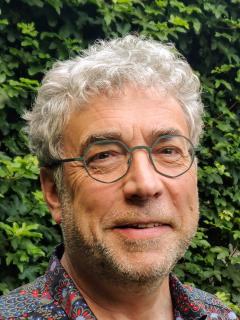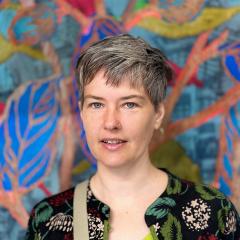Claude Missiaen and I met online recently to speak about his time on the International Leadership Council (ILC) coming to an end, and to share his story of this time. Our conversation follows:
Rachel: Would you tell us how you came to be on the ILC, what was involved, and how you ended your work there?
Claude: Yes, I’ll try... I don't know why I wanted to be there (laughing) … I was asked to do it.
I had a conversation with Catherine (Torpey) and it seemed that my name had come up in discussions with the nominating committee. So I didn't know why, but I liked to be asked to do it and I had a very nice conversation with Catherine and, yeah we just started. In the beginning it was not so easy for me, I did not know much about what being on the ILC would mean; what its goal was or what was the relation between it and the Board, and with the community.
So I felt quite insecure for the first two years, but then later on I got more self-confidence in it and I started to be aware of the importance of our work and what we needed to do. Then came the time that we organized conversations with the Coordinators - as we still do, or as the ILC still does - and I guess that was a bit of a turning point for me because then it was not so abstract. Not just thinking of the organization, instead these conversations with the Coordinators were very concrete, with all those Coordinators coming to these conversations, sharing their feedback and so on.
And then that was very nice, and also the constellation of members on the ILC changed, as always, and with these new people I felt more at ease. I think the last year or maybe two years we had a really wonderful group of friends. We laughed a lot also, so we were kind of joking in between the serious work.
So yes, when it was time to go for me after six years - you cannot stay longer than six years - we had a very nice goodbye session and they all gave me some very personal words, so there was also a kind of connection that was far more, far beyond just being in a task force together. And then afterwards, I looked in my calendar and I found out that I did not serve six years, but seven years! It was a mistake! It was not meant to be like that, but it seemed to be that I started a year earlier than I thought, and I realized, “Oh my God then I've been there for seven years!”
Rachel: Is there something in particular that you remember about being part of the ILC?
Claude: It’s quite intensive. It meets every two weeks, more or less, for one hour which is not much, but of course you have to prepare some work in between. But it was a wonderful time.
Rachel: Maybe it's that warmth, that just enjoying the group? Tell me more about the group and your work together.
Claude: Well, the group is not the purpose of itself, of course. The group, when it's good, is a good medium to do your job.
So we did some quite important things, for me. When I joined, I came to understand more about the new procedure for nominating Coordinators. This was already started when I joined, but still needed our help to continue developing it in meetings with the Coordinators. It took another two years or so before it could be finalized. It was very important for me and the whole ILC that this job was done well, and now it is the way that Coordinators can be nominated, so this procedure is now accepted by the Board and by the community.
I'm also proud that we have a kind of ethical code, which follows a Focusing way. It's a document about concerns regarding a Coordinator of TIFI [or other individuals]. There is now a kind of procedure, but in a ‘Focusing way’ with a lot of mediation and listening, so that is also very nice and important to have a way to manage this.
And what I am particularly proud of is that we initiated the cooperation with the Board of TIFI. When I joined the ILC it did not meet with the Board, but now things have changed and the Board knows more about what the ILC is doing and vice versa. For example, we visit each other's meetings now, which is also very helpful. This has been a good start with more connection emerging between the Board and ILC.
Rachel: Yeah, yeah, that sounds like a very important relationship. It sounds like the ILC and the Board used to work in parallel and now they are connected.
Claude: Yes, parallel and more abstract, or more formal, while now we meet with each other, so that's also another more human factor coming into play.
Rachel: Yes, that sounds like a very important change. And, I’m wondering, now that your time at the ILC has ended, is there something you'd like to say about your plans for your future with Focusing? Maybe you're having some more time for yourself or do you already have a Focusing next step? Have you thought about the Conference in Vienna in 2026?
Claude: Yes, well the community is still growing, there are more and more members, Coordinators and Trainers and so that's fantastic. Here in Leuven we had a workshop with Akira (Ikemi) two weeks ago and it was wonderful, really wonderful yeah. We had 30 participants and a long list of people who could not attend, but who would have liked to attend.
The only continent that really is behind is Africa. It would be nice if there were also some Focusers there who could spread the news. And yes, I'm looking forward to the Conference in Vienna. I think it will be a very nice gathering.
Rachel: Wow, well what a what a beautiful dream to have more of Africa in our community. I loved attending the Weeklong in Punta de Tralca, Chile and the International Conference in Mexico, and witnessing the English-speaking North American Focusing community being hosted by Spanish-speaking parts of the Americas. That really was so much fun and expansive. I’d love to have a similar time with Europe and Africa, and of course the rest of the world. I feel so enthusiastic about this direction.
Claude: Now we see that in our country [Belgium], Focusing is really growing also - not that fast, but it is growing and you may know that I have a cooperation with Warsaw in Poland. I have been there every year for the past 12 years and in the last two or three years it's really booming, They have begun a Polish Focusing Institute, they organize their own conferences in Polish, their own workshops, their own publications!
So now this train is really on a high speed and I'm very happy, and a bit proud too.
And I hope that will expand even more, they are also more connected now with the West after they have been feeling isolated for very long time.
Now they feel more connected, they will come to the international conferences and workshops, and so and I'm very glad about that. And sure, they will be in Vienna too.
Rachel: Yes, yes. It will be a wonderful opportunity to get together in person and meet the Polish Focusing community too.
Claude: Great.
Rachel: Is there anything else you'd like to add?
Claude: Well, I think it's a very good idea that in this Focusing Community there are so many volunteers because otherwise, this work would not be possible. TIFI cannot live without volunteers like you and me, and the ILC is also completely voluntary. Sometimes I thought about all that work preparing documents and so on, I was the "prime mover" [chairperson] for a long time. So, I had to prepare the meetings with Catherine in between, but I think it's very good that these jobs are not paid and that you can do it with your heart. And if you don't do it with your heart, then you won't do it.
So, I think it's good that there is such a tradition of volunteering.
Rachel: Yes. I helped to organize the last online Focusing Oriented Therapy Conference, and that was maybe a year and a half of meeting regularly. It both took a lot of time and energy and it was really nice to be part of it, so I feel like I have a tiny version of what you're describing.
Claude: Yeah.
Rachel: Thank you very much for taking the time to talk about your work with the ILC and give us a sense of what that is all about. I’ll let you get on with your day. It's been really nice to meet you and hopefully see you in Vienna, if not on a little screen before then.
Claude: I hope so yeah, let's meet in Vienna.
Rachel: See you in Vienna. Yeah, lovely bye.
Rachel Hendron is a Certified Focusing Therapist and Trainer, she is an Accredited BACP Psychotherapist and Supervisor and works remotely from England. She is very happily studying Gendlin’s Philosophy of the Implicit, Amerta Movement, making art and working as she travels through her website https://reset.cc/.


